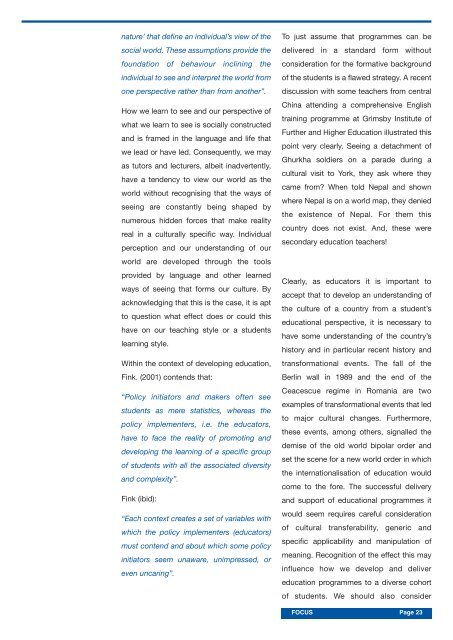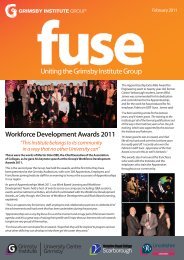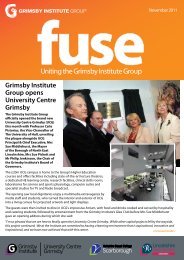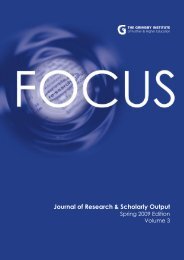Journal of Research & Scholarly Output 2006 - Grimsby Institute of ...
Journal of Research & Scholarly Output 2006 - Grimsby Institute of ...
Journal of Research & Scholarly Output 2006 - Grimsby Institute of ...
You also want an ePaper? Increase the reach of your titles
YUMPU automatically turns print PDFs into web optimized ePapers that Google loves.
nature’ that define an individual’s view <strong>of</strong> the<br />
social world. These assumptions provide the<br />
foundation <strong>of</strong> behaviour inclining the<br />
individual to see and interpret the world from<br />
one perspective rather than from another”.<br />
How we learn to see and our perspective <strong>of</strong><br />
what we learn to see is socially constructed<br />
and is framed in the language and life that<br />
we lead or have led. Consequently, we may<br />
as tutors and lecturers, albeit inadvertently,<br />
have a tendency to view our world as the<br />
world without recognising that the ways <strong>of</strong><br />
seeing are constantly being shaped by<br />
numerous hidden forces that make reality<br />
real in a culturally specific way. Individual<br />
perception and our understanding <strong>of</strong> our<br />
world are developed through the tools<br />
provided by language and other learned<br />
ways <strong>of</strong> seeing that forms our culture. By<br />
acknowledging that this is the case, it is apt<br />
to question what effect does or could this<br />
have on our teaching style or a students<br />
learning style.<br />
Within the context <strong>of</strong> developing education,<br />
Fink. (2001) contends that:<br />
“Policy initiators and makers <strong>of</strong>ten see<br />
students as mere statistics, whereas the<br />
policy implementers, i.e. the educators,<br />
have to face the reality <strong>of</strong> promoting and<br />
developing the learning <strong>of</strong> a specific group<br />
<strong>of</strong> students with all the associated diversity<br />
and complexity”.<br />
Fink (ibid):<br />
“Each context creates a set <strong>of</strong> variables with<br />
which the policy implementers (educators)<br />
must contend and about which some policy<br />
initiators seem unaware, unimpressed, or<br />
even uncaring”.<br />
To just assume that programmes can be<br />
delivered in a standard form without<br />
consideration for the formative background<br />
<strong>of</strong> the students is a flawed strategy. A recent<br />
discussion with some teachers from central<br />
China attending a comprehensive English<br />
training programme at <strong>Grimsby</strong> <strong>Institute</strong> <strong>of</strong><br />
Further and Higher Education illustrated this<br />
point very clearly. Seeing a detachment <strong>of</strong><br />
Ghurkha soldiers on a parade during a<br />
cultural visit to York, they ask where they<br />
came from? When told Nepal and shown<br />
where Nepal is on a world map, they denied<br />
the existence <strong>of</strong> Nepal. For them this<br />
country does not exist. And, these were<br />
secondary education teachers!<br />
Clearly, as educators it is important to<br />
accept that to develop an understanding <strong>of</strong><br />
the culture <strong>of</strong> a country from a student’s<br />
educational perspective, it is necessary to<br />
have some understanding <strong>of</strong> the country’s<br />
history and in particular recent history and<br />
transformational events. The fall <strong>of</strong> the<br />
Berlin wall in 1989 and the end <strong>of</strong> the<br />
Ceacescue regime in Romania are two<br />
examples <strong>of</strong> transformational events that led<br />
to major cultural changes. Furthermore,<br />
these events, among others, signalled the<br />
demise <strong>of</strong> the old world bipolar order and<br />
set the scene for a new world order in which<br />
the internationalisation <strong>of</strong> education would<br />
come to the fore. The successful delivery<br />
and support <strong>of</strong> educational programmes it<br />
would seem requires careful consideration<br />
<strong>of</strong> cultural transferability, generic and<br />
specific applicability and manipulation <strong>of</strong><br />
meaning. Recognition <strong>of</strong> the effect this may<br />
influence how we develop and deliver<br />
education programmes to a diverse cohort<br />
<strong>of</strong> students. We should also consider<br />
FOCUS Page Page 23

















